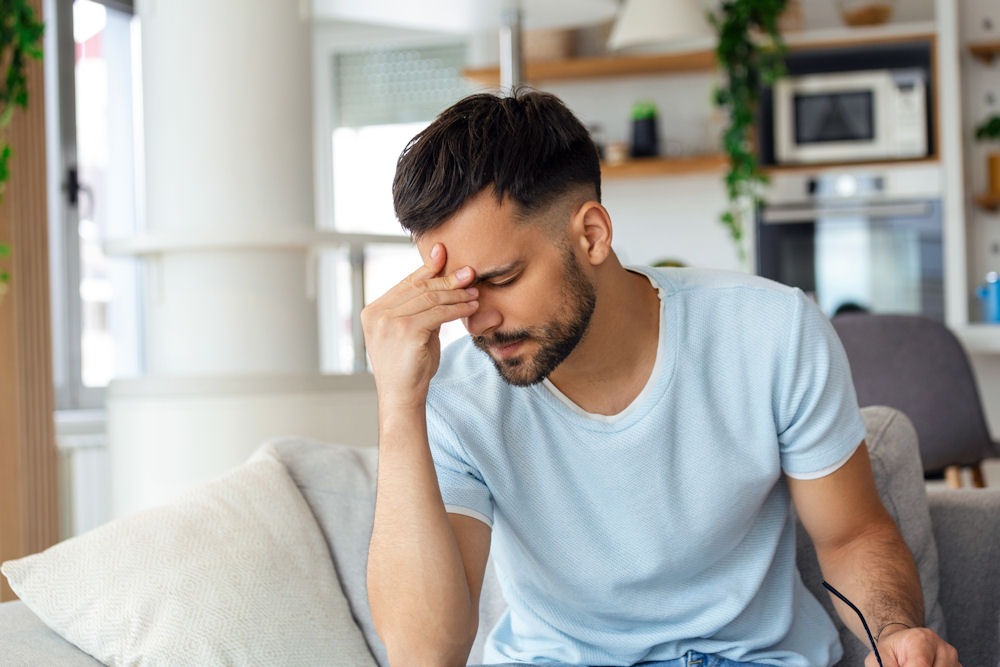Intensive Outpatient Programs (IOP) have proven effective in treating anxiety and depression by providing structured, flexible care. IOP offers therapy sessions multiple times a week, combining individual and group counseling to address underlying issues and develop coping skills. This approach allows patients to maintain daily responsibilities while receiving comprehensive support. Many participants experience significant symptom reduction and improved quality of life. With personalized treatment plans, IOP helps individuals build resilience and achieve lasting mental health recovery.
If you struggle with your mental health, our outpatient mental health program can teach you how to manage symptoms and lead to recovery.
How Is Anxiety Treated in an IOP?
Anxiety treatment in an Intensive Outpatient Program (IOP) combines various therapeutic approaches to help individuals manage symptoms and improve daily functioning. IOP offers structured sessions that include individual therapy, group counseling, and skill-building activities. Cognitive-behavioral therapy (CBT) is often a key component, teaching patients how to identify and challenge negative thought patterns. Relaxation techniques, mindfulness, and stress management strategies are also incorporated to reduce anxiety symptoms.
Key components of anxiety treatment in IOP include:
- Cognitive-behavioral therapy (CBT)
- Group therapy and peer support
- Mindfulness and relaxation exercises
- Coping skills development
- Family involvement and education
- Medication management when appropriate
This comprehensive approach equips individuals with tools to manage anxiety effectively and promotes long-term wellness.
How Is Depression Treated in an IOP
 Depression treatment in an Intensive Outpatient Program (IOP) focuses on providing comprehensive care through a combination of therapies and support. IOP offers regular individual and group therapy sessions where patients learn to identify negative thought patterns and develop healthier coping strategies. Dialectical Behavior Therapy (DBT) is commonly used to help patients manage emotions, build distress tolerance, and improve interpersonal effectiveness while addressing depressive thoughts. Additionally, mindfulness practices and stress management techniques help reduce symptoms. Medication management may be included when appropriate. Family involvement is encouraged to support recovery.
Depression treatment in an Intensive Outpatient Program (IOP) focuses on providing comprehensive care through a combination of therapies and support. IOP offers regular individual and group therapy sessions where patients learn to identify negative thought patterns and develop healthier coping strategies. Dialectical Behavior Therapy (DBT) is commonly used to help patients manage emotions, build distress tolerance, and improve interpersonal effectiveness while addressing depressive thoughts. Additionally, mindfulness practices and stress management techniques help reduce symptoms. Medication management may be included when appropriate. Family involvement is encouraged to support recovery.
Key elements of depression treatment in IOP include:
- Cognitive-behavioral therapy (CBT) and Dialectical behavior therapy (DBT)
- Group therapy and peer support
- Mindfulness and relaxation techniques
- Coping skills development
- Medication management, if needed
- Family education and involvement
This holistic approach helps individuals build resilience and work toward lasting recovery.
When Should You Get Treatment for Anxiety?
You should consider seeking treatment for anxiety when it begins to interfere with your daily life, relationships, or ability to function. If feelings of worry, fear, or panic become overwhelming or persistent, professional help can provide relief. Symptoms such as difficulty sleeping, trouble concentrating, irritability, or physical issues like rapid heartbeat may indicate that anxiety is affecting your well-being. Early intervention is important to prevent symptoms from worsening and to develop effective coping strategies. If anxiety causes significant distress or disrupts your normal routine, reaching out to a mental health professional is a crucial step toward recovery and improved quality of life.
Signs of Anxiety
Anxiety can manifest through a variety of emotional, physical, and behavioral signs. Recognizing these symptoms early helps in seeking appropriate treatment and support. Common signs include persistent worry, restlessness, and difficulty concentrating. Physical symptoms often involve a racing heart, muscle tension, and fatigue. Behavioral changes like avoiding certain situations or social withdrawal may also occur. Understanding these signs is essential for managing anxiety effectively and improving overall well-being.
Key signs of anxiety include:
- Excessive worry or fear
- Restlessness or feeling on edge
- Difficulty concentrating
- Rapid heartbeat or shortness of breath
- Muscle tension or headaches
- Sleep disturbances
- Avoidance of stressful situations or social events
When Should You Get Treatment for Depression?
 You should seek treatment for depression when feelings of sadness, hopelessness, or emptiness persist for weeks or interfere with your daily life. If you notice a loss of interest in activities you once enjoyed, changes in appetite or sleep patterns, or difficulty concentrating, it may be time to get help. Depression can also cause physical symptoms like fatigue or unexplained aches. Early treatment is important to prevent symptoms from worsening and to improve your overall quality of life. If you experience thoughts of self-harm or suicide, seek immediate professional support to ensure your safety and well-being.
You should seek treatment for depression when feelings of sadness, hopelessness, or emptiness persist for weeks or interfere with your daily life. If you notice a loss of interest in activities you once enjoyed, changes in appetite or sleep patterns, or difficulty concentrating, it may be time to get help. Depression can also cause physical symptoms like fatigue or unexplained aches. Early treatment is important to prevent symptoms from worsening and to improve your overall quality of life. If you experience thoughts of self-harm or suicide, seek immediate professional support to ensure your safety and well-being.
Signs of Depression
Depression can affect individuals in many ways, and recognizing its signs early is crucial for effective treatment. Emotional symptoms often include persistent sadness, feelings of hopelessness, and loss of interest in activities once enjoyed. Physical symptoms such as changes in appetite, sleep disturbances, and fatigue are common. Depression may also impact concentration and decision-making. Behavioral changes, like social withdrawal or irritability, can be warning signs. Being aware of these symptoms helps individuals seek help promptly and begin the recovery process.
Common signs of depression include:
- Persistent sadness or emptiness
- Loss of interest in hobbies
- Changes in appetite or weight
- Sleep problems
- Fatigue or low energy
- Difficulty concentrating
- Social withdrawal or irritability
What Is the Best Treatment for Anxiety?
The best treatment for anxiety combines therapy, medication, and lifestyle changes tailored to each person’s unique needs. Cognitive-behavioral therapy (CBT) helps individuals recognize and change negative thought patterns that contribute to anxiety. Medication, such as antidepressants or anti-anxiety drugs, may be prescribed for moderate to severe cases. Additionally, mindfulness practices, relaxation exercises, and regular physical activity can significantly reduce anxiety symptoms. Supportive relationships with family and friends, along with early intervention, play a crucial role in improving treatment outcomes and promoting long-term mental health and overall well-being.
- Cognitive-Behavioral Therapy (CBT): Focuses on identifying and changing negative thought patterns. CBT reduces anxiety, improves coping skills, and helps individuals manage stress more effectively.
- Medication Assisted Treatment: Involves the use of antidepressants or anti-anxiety medications. Medications for anxiety or depression help manage symptoms of mental health conditions, allowing for greater stability and improved daily functioning.
- Mindfulness & Relaxation: Includes practices like meditation and breathing exercises. These techniques calm the mind, reduce stress, and enhance emotional regulation.
- Exercise: Incorporates regular physical activity such as walking, running, or yoga. Exercise boosts mood, reduces physical and emotional tension, and promotes overall well-being.
- Social Support: Involves connection with family, friends, or participation in support groups. This support provides encouragement, reduces feelings of isolation, and fosters a sense of belonging.
What Is the Best Treatment for Depression?
The best treatment for depression often involves a combination of therapy, medication, and lifestyle changes tailored to each individual. Cognitive-behavioral therapy (CBT) helps identify and change negative thought patterns contributing to depression. Antidepressants may be prescribed for moderate to severe cases. Regular exercise, a healthy diet, and sufficient sleep also support recovery. Additionally, support from family and friends provides important emotional encouragement. Early intervention and a personalized treatment plan greatly increase the chances of lasting improvement, better mental health, and overall well-being for those struggling with depression.
Here’s a chart summarizing key depression treatments:
Does Anxiety Get Worse?
Anxiety can get worse over time if left untreated. What may start as occasional worry or mild nervousness can develop into persistent and overwhelming anxiety that interferes with daily life. Stressful life events, trauma, or ongoing pressures can contribute to worsening symptoms. Without proper treatment, anxiety can lead to physical problems such as headaches, digestive issues, or sleep disturbances, and may also increase the risk of depression or substance use.
You can get help for your anxiety through our PHP for mental health. Seeking support early—whether through therapy, lifestyle changes, or medication—can prevent anxiety from escalating and improve overall mental well-being, helping individuals manage symptoms more effectively and maintain a balanced life. For those dealing with co-occurring mental health and substance use concerns, our dual diagnosis treatment Portland, Oregon provides integrated care to address both conditions simultaneously for a more comprehensive recovery.
How to Manage Depression
Managing depression involves a combination of strategies to improve mood and overall well-being. Seeking professional help through therapy, such as cognitive-behavioral therapy (CBT), can provide tools to challenge negative thoughts and develop healthier coping skills. Medication may also be prescribed for moderate to severe depression to balance brain chemistry. Incorporating daily exercise, maintaining a healthy diet, and establishing a consistent sleep routine can positively impact mood. Staying connected with supportive family and friends helps reduce feelings of isolation. Practicing mindfulness or relaxation techniques can ease stress. Creating small, achievable goals each day can build motivation and promote a sense of accomplishment.
Frequently Asked Questions (FAQs) on Anxiety and Depression
Anxiety symptoms include excessive worry, restlessness, and physical tension, while depression symptoms involve persistent sadness, loss of interest, and fatigue.
Both can be caused by genetics, brain chemistry, trauma, or life stressors.
Treatment may include therapy, medication, lifestyle changes, or a combination.
Yes, it’s common to experience anxiety and depression together.
Seek help if symptoms interfere with daily life, relationships, or cause distress. Early treatment improves outcomes
Mental Health Treatment in Portland at Crestview Recovery
 Mental health treatment in Portland at Crestview Recovery provides compassionate, individualized care for those struggling with anxiety, depression, trauma, and other mental health concerns. Our programs are designed to meet each client’s unique needs, offering a combination of evidence-based therapies, holistic approaches, and ongoing support to promote healing and long-term wellness. At Crestview Recovery, our experienced team of licensed therapists, counselors, and medical professionals works closely with each client to create personalized treatment plans that address the root causes of their struggles while building coping skills and resilience.
Mental health treatment in Portland at Crestview Recovery provides compassionate, individualized care for those struggling with anxiety, depression, trauma, and other mental health concerns. Our programs are designed to meet each client’s unique needs, offering a combination of evidence-based therapies, holistic approaches, and ongoing support to promote healing and long-term wellness. At Crestview Recovery, our experienced team of licensed therapists, counselors, and medical professionals works closely with each client to create personalized treatment plans that address the root causes of their struggles while building coping skills and resilience.
We believe in treating the whole person—mind, body, and spirit—to help individuals achieve lasting recovery and improved mental health. Whether you need outpatient treatment, partial hospitalization, or aftercare support, we are here to guide you every step of the way. If you’re ready to begin your journey toward wellness, contact us today to speak with a caring team member and learn more about our programs.
































